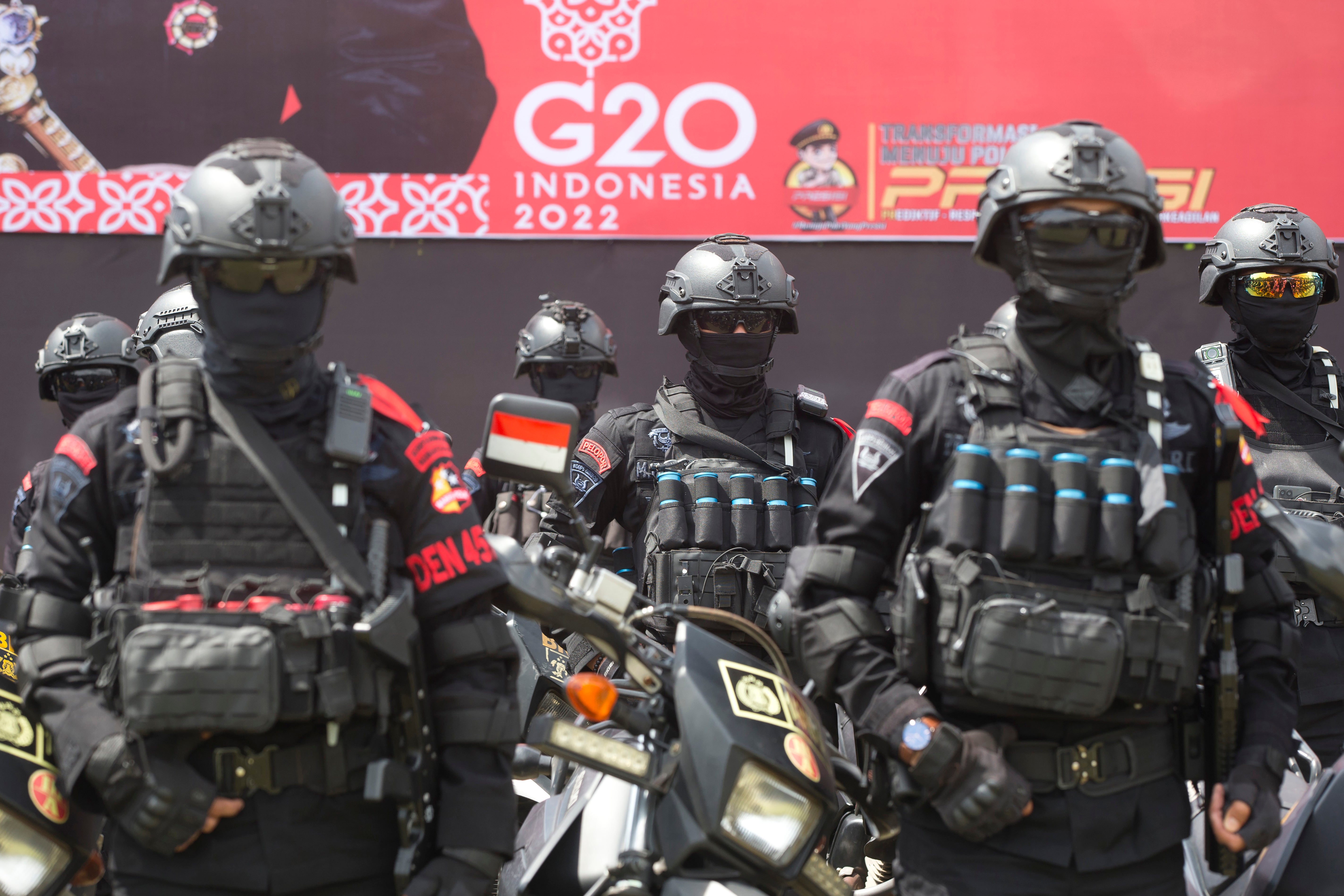
Rishi Sunak today vowed to “call out” Russia for its war on Ukraine when he comes face-to-face with a member of Vladimir Putin’s inner circle for the first time as prime minister.
With the Russian president himself skipping the G20 summit in the Indonesian resort Bali, Mr Sunak will instead deliver his message of condemnation to Putin’s foreign secretary and chief apologist Sergey Lavrov as they face one another across the conference table.
The confrontation comes as Mr Putin’s war plans sink deeper into disarray following the Russian retreat from Kherson, the only regional capital seized during the nine-month invasion.
Ukrainian police returned to the southern city on Saturday, along with state TV and radio services, following the withdrawal of Russian troops. Around 200 officers set up checkpoints and began the job of documenting evidence of possible war crimes
The Ukrainian military said it was overseeing stabilisation measures, including demining and neutralising unexploded ordnance, to make the city safe. But one official described conditions in Kherson after months of occupation as a “humanitarian catastrophe”, with shortages of food, water and medicines.
"The occupiers and collaborators did everything possible so that those people who remained in the city suffered as much as possible over those days, weeks, months of waiting," said Roman Holovnya, an adviser to Kherson’s mayor. "Water supplies are practically non-existent."
Defence secretary Ben Wallace said the withdrawal from Kherson amounted to “another strategic failure” for Putin.
"In February, Russia failed to take any of its major objectives except Kherson,” said Wallace. “Now with that also being surrendered, ordinary people of Russia must surely ask themselves, ‘What was it all for?’”
Russia still occupies around 70 per cent of Kherson province, and its troops are now dug into extensive defensive lines on the left bank of the Dnipro river. President Volodymyr Zelensky suggested that some Russian soldiers could remain in the city, disguised in civilian clothes.
Having shed little light on his foreign policy approach before becoming PM last month, the annual gathering of world leaders opening in Bali on Tuesday grants Mr Sunak an opportunity to introduce himself on the global stage.
But he faces a struggle to position himself as a leader of the international coalition against the invasion to the same extent as Boris Johnson, who went to great efforts to place himself at the centre of the global response, striking up a personal rapport with Mr Zelensky.
The crisis in Ukraine will inevitably dominate the two-day gathering at the expense of a formal agenda focusing on energy, food and digital issues.
With Mr Lavrov ready to wield Moscow’s veto on any proposed agreement between the G20 states, diplomats accept that it will be all but impossible to produce the customary end-of-summit communiqué setting out common targets and commitments.
Preparing to depart for Bali, Mr Sunak said that the annual get-together of presidents, prime ministers and princes cannot be “business as usual” while Russian troops are on Ukrainian soil.
He called for “coordinated and decisive action” by G20 members to counter the economic turmoil caused by the nine-month-old invasion by creating a “stable international platform” to rein in inflation and return to growth.
Thursday’s Autumn Statement, in which chancellor Jeremy Hunt is expected to set out plans to fill a £60bn gap in the UK’s finances, will form part of this effort to set a course back towards economic normality, he said.
“Putin’s war has caused devastation around the world, destroying lives and plunging the international economy into turmoil,” said Mr Sunak.
“This G20 summit will not be business as usual. We will call out Putin’s regime and lay bare their utter contempt for the kind of international cooperation and respect for sovereignty that forums like the G20 represent.
“In clear contrast to Putin’s disruption, the UK and our allies will work together to make meaningful progress solving the economic challenges we face and making lives better for our people.”
The PM’s official spokesperson said Mr Sunak will use the opportunity presented by the summit to “ensure the Russian government reckons with the devastation they are causing to Ukraine, to their country and to the world”.
The Bali summit comes a week ahead of the 19 November expiry date for a deal enabling shipments of Ukrainian grain to be exported via the Black Sea.
With Moscow holding up renewal of the deal, Ukraine’s foreign minister Dmytro Kuleba accused Russia of “playing hunger games with the world”.

The United Nations says 10 million tonnes of grain and other foods have been exported from Ukraine under the initiative agreed in July, helping to stave off a global food crisis.
But Russian deputy foreign minister Sergei Vershinin said on Saturday that progress on extending the deal would not be possible without unhindered access for Russia’s own food and fertiliser exports to world markets.
Mr Kuleba said that as well as raising obstacles to the deal’s continuation, Russia was engaging in “quiet sabotage” by allowing its inspectors to drag their feet over allowing shipments through.
Not only does Russia have "to remain part of the initiative, it also has to instruct its inspectors to act in good faith and to avoid any measures, any steps, that create obstacles and hinder the export of Ukrainian agricultural goods to the global market," he said. "Russia should – must – stop playing hunger games with the world."
Mr Kuleba struck a cautious note on the Ukrainian victory in Kherson.
"We are winning battles on the ground, but the war continues," he said. "Every time we liberate a piece of our territory, when we enter a city liberated from the Russian army, we find torture rooms and mass graves with civilians tortured and murdered by the Russian army in the course of the occupation.
"It’s not easy to speak with people like this. But I said that every war ends with diplomacy and Russia has to approach talks in good faith."







